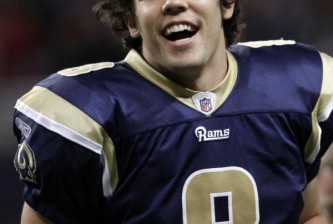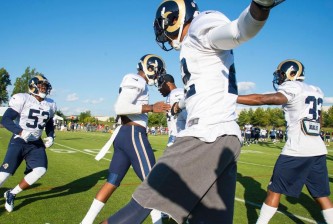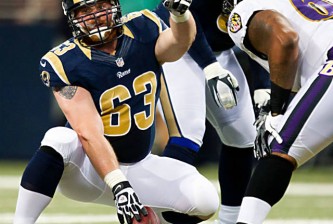 Gregg Williams’ “bounty” program in Washington and New Orleans has torn the lid off one of the NFL’s dirty little secrets.
Gregg Williams’ “bounty” program in Washington and New Orleans has torn the lid off one of the NFL’s dirty little secrets.
Competition brings out the best – and sometimes the worst – in all of us. Whether you’re watching games on the couch, screaming “KILL HIM!” or just silently wishing it, or actually in the heat of game action, head on a swivel, looking out for the next big hit, the thrill of competition brings our animal instincts to the fore. The games we watch and the games we play tap directly into the lizard-like cortex at the top of your brainstem that assigns friends and enemies, that sends “fight” or “flee” signals throughout your nervous system.
That people get paid money to satisfy our need as fans for these vicarious thrills is nothing new. We aren’t Aztecs or Romans, putting on games with literal lives at stake. We use money and/or glory as stakes instead. But the games do provoke a bloodlust that sometimes gets dangerously close to crossing the line. Sometimes the game’s very flirtation with that line – having a player like Ray Lewis or James Harrison put the fear of God in us with every hit, for example – is what compels us to watch.
Of course, there’s a strongly running counter-current, a higher-brain response to the bloodlust, that we term “sportsmanship.” The genetic impulse that drives Warren Sapp to beat whatever man stood in front of him and drive the quarterback into the ground gets switched off when the whistle blows, and a second impulse makes Sapp smile broadly and help the poor bastard up. It’s all in the game, and we all have our lives to lead when the game is over.
The balance between those two impulses, the line between the emotion and violence of the game and the respect we’re supposed to feel for fellow man or fellow competitor, is a hazy one. Once that line is crossed, though, everyone knows it. A decades-old rivalry between cities gets thrown into upheaval when a San Francisco fan is brutally beaten by a Los Angeles fan outside the stadium. A whole stadium gets hushed and remorseful when a clean hit ends up breaking the neck of a high school hockey player.
Other times, that line is hazy, as in the “bounty” program run by Gregg Williams in New Orleans and Washington (and elsewhere?) that is now under heavy scrutiny by the NFL. Reportedly, defensive players assigned “price tags” or rewards associated with big hits, with bonuses associated if that hit ended up sending the player to the sideline.
Put in plain english like that, it sounds a step or so away from contract murder. If there was a football hell, fans of Peyton Manning, Brett Favre, or Kurt Warner – all players that may have taken career-altering hits as part of this bounty program – would certainly be wishing Williams toward it. But Matt Bowen, one of his former players, paints a different picture of the bounty program.
Here’s how Bowen tells the tale. (Emphasis mine.)
In a makeshift meeting room, with the whisper of evening traffic pouring in from the Beltway, we laid our bounties on opposing players. We targeted big names, our sights set on taking them out of the game.
Price tags started low during the regular season — a couple hundred bucks for going after the quarterback hard or taking a running back out below the knees. Chop him down and give a quick smile when you got back to the huddle. You just got a bonus.
The pot was collected throughout the season through fines. Show up late? Ding. Blow an assignment during practice? Again. Walk on the field with your chinstrap unbuckled. Again. Break the rules, you gave to the bank.
The cash was kept stashed away at the team facility, in safe hands. After coaches reviewed Sunday’s film, we paid it back out. Our accountability, governed by our accounting.
Last night, in my bowling league, I brought up the bounty program and the looming clouds that will be hanging over Williams, Jeff Fisher and the Rams, and got an altogether different reaction than I expected.
“Why can’t you do that?” asked Jeff, and went on to compare the small-dollar bounties to us playing dollar-stakes poker while we bowl, drawing a card for every strike or spare.
“What’s a defensive lineman’s job when he lines up?” asked Rod, rhetorically. Then he answered himself: “Kill the quarterback. The only reason they’re getting in trouble is because they used money. They should have paid them in Skittles or something.”
Getting back to Bowen:
Williams is an excellent motivator. You do what he wants: play tough, push the envelope and carry a swagger that every opponent sees on tape. When you lined up against us, you knew we were coming after you. It was our gig, our plan, our way to motivate, to extra-motivate.
For his part, Kurt Warner doesn’t believe the hit that knocked him nearly senseless in the Cardinals’ 2009 playoff game against the Saints was a cheap shot or a dirty play. “I understand [now] they were levying a bounty. But were they going out and cheap shotting guys? That is something I would definitely look into.”
For Warner, this is where the line is drawn. It’s not about the bounty. It is, and always has been, about the intent. Sure, hit the guy as hard as you can. That’s what you’re supposed to do, and that’s what the other guy is going to do to you. That’s what NFL players have always done, from the days of fearsome Deacon Jones on up to today. But anything beyond that? It doesn’t take money to turn a player dirty. But putting a price tag on a hit does dirty the game in some players’ eyes.
Said Warren Sapp in a Twitter conversation with former Eagle Brian Mitchell: “You can’t play the game we love with [malice] in your heart and dollar signs in your eyes.”
But putting a bounty on a player isn’t the same as intentionally putting that player in the hospital, or putting that player’s career in jeopardy. Commissioner Roger Goodell has been steadily legislating certain types of hits out of the game, in the name of player safety. Now he starts to wade into a much murkier area of legislating motivational tactics. His ruling just might drive Gregg Williams out of a job. That would be a shame, says Bowen.
I don’t regret any part of it. I can’t. Williams is the best coach I ever played for in my years in the NFL, a true teacher who developed me as a player. I believed in him. I still do. That will never change.






















